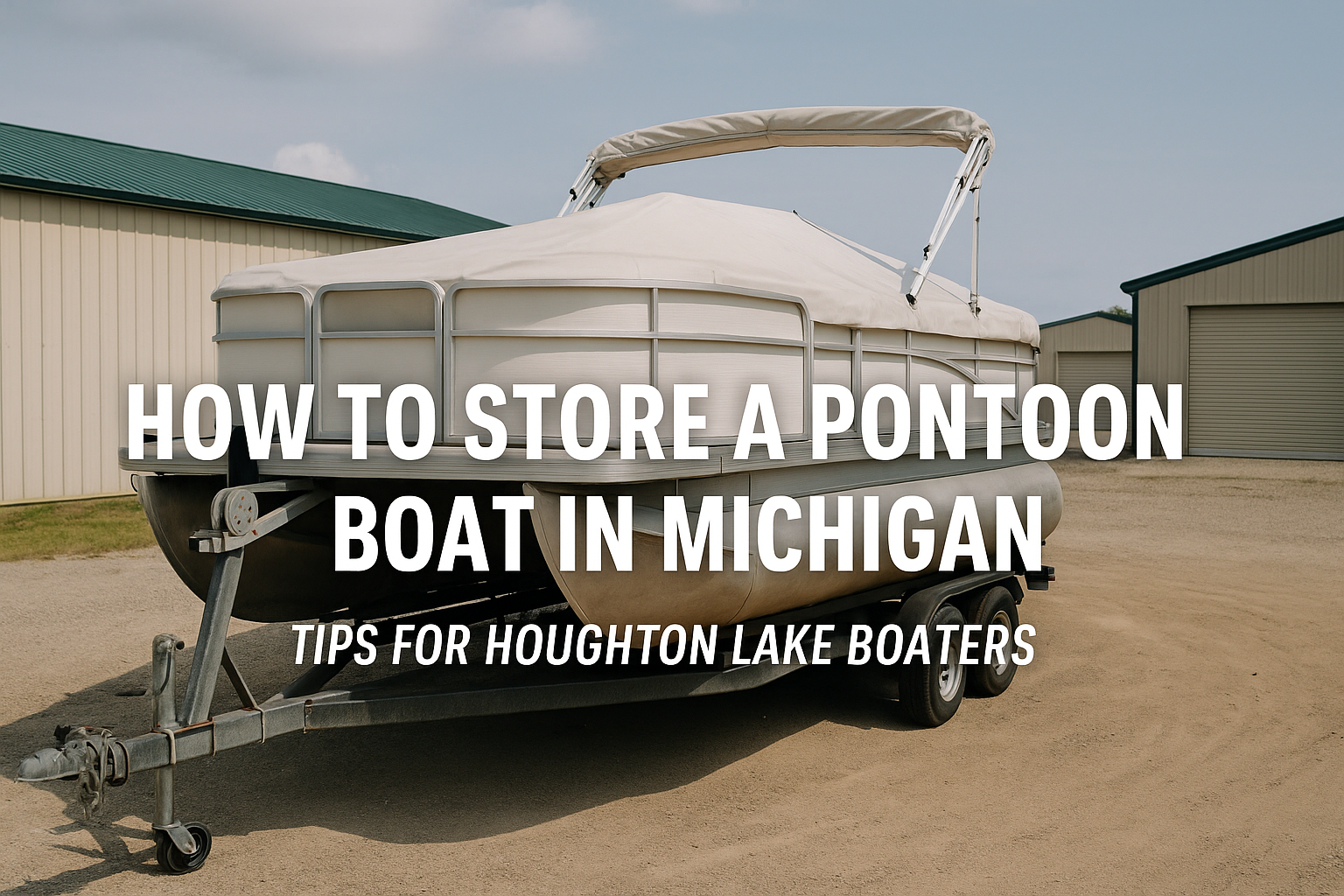The Ultimate Guide to Pontoon Storage
Alex Parr
July 22nd, 2025

How Houghton Lake Locals Keep Their Boats Safe Year-Round
If you’re wondering how to store a pontoon boat in Michigan, especially near Houghton Lake, here’s the answer: clean it thoroughly, remove all gear and valuables, add fuel stabilizer, disconnect the battery, and store it in a secure, covered unit that protects against harsh winter weather. Shrink wrap or high-quality fitted covers work too.
Houghton Lake is one of Michigan’s best boating destinations, and that means lots of locals (and weekend visitors) own pontoons. But when boating season ends, many boaters are left scrambling to find the best way to keep their pontoon safe until spring. That’s where we come in. This guide shares exactly how seasoned Houghton Lake boaters prep and store their pontoons, with advice on storage unit types, trailer setup, pest prevention, and why drive-through access is a game-changer for large watercraft.
Short-Term Pontoon Storage (Between Lake Days)
If you’re taking your boat out every weekend, you don’t need full winterization, but you do need basic protection. Here’s how Houghton Lake locals handle short-term pontoon storage:
- Clean the Deck After Each Trip: Rinse off sand, fish guts, snacks, and any leftover bait. Letting messes sit in the sun leads to stains and mildew.
- Use a Fitted Mooring Cover: Even for a few days, a tight-fitting cover will block UV rays, bird droppings, leaves, and rainwater.
- Tilt and Drain the Motor: This prevents water from sitting inside and reduces the risk of corrosion or early-season damage.
- Keep It Close to the Water: Storing your pontoon just minutes from the lake (like at Houghton Lake Boat & RV Storage) means less hauling and easier access whenever the weather’s nice.
Long-Term Storage (End-of-Season or Off-Season)
When summer ends, long-term storage becomes all about protection. Michigan winters are no joke—freezing temps, heavy snow, and hungry rodents can do real damage to your pontoon if you don’t prepare.
- Step 1: Deep Clean Everything: Wash the exterior. Scrub the deck. Clean out coolers and compartments. Moisture, food crumbs, and dirt will invite mold or pests if left unchecked.
- Step 2: Drain Water Lines and Tanks: Pull the drain plug, empty the livewell, bilge, and any onboard sinks or tanks. Water left inside can freeze and crack key systems.
- Step 3: Fuel Stabilizer and Battery Disconnect: Add a marine-grade fuel stabilizer to prevent varnish or clogs. Run the engine briefly to circulate it. Then disconnect and remove the battery or hook it up to a smart charger for maintenance mode.
- Step 4: Cover or Shrink Wrap: A custom-fitted winter cover or shrink wrap is essential for keeping out moisture, snow, and animals. Use support poles to prevent water from pooling if you’re using a standard cover.
- Step 5: Elevate and Ventilate: Use blocks or stands to slightly raise the boat and trailer, helping drainage and reducing tire flat spots. Ventilation helps prevent mildew. Crack open hatches or use moisture-absorbing desiccant packs.
Storage Unit Options: What Works Best for Pontoons
Not all storage spaces are equal when it comes to boats. Here’s what experienced boaters recommend around Houghton Lake:
- Large Storage Units: These allow you to pull in and pull out without backing up, which is a huge help with longer pontoons or enclosed trailers. It saves time, avoids stress, and prevents accidents.
- Tall-Ceiling, Wide-Door Units: Pontoons are wide and tall. Make sure your unit has a high clearance and enough turning space to maneuver safely.
- Gated, Secure Facilities: You want peace of mind when your boat’s in storage. Look for gated access, cameras, and well-lit spaces.
Trailer Storage Tips
Your trailer setup plays a big role in protecting your pontoon during storage:
- Chock the Wheels and Stabilize the Frame: Prevent shifting during wind or ice by securing the trailer with proper wheel chocks and blocks.
- Cover the Tires: UV rays cause sidewall cracking over time. Use covers or simply place plywood panels over the tires.
- Check the Pressure Regularly: Especially before moving your boat in spring. Cold weather causes pressure loss.
Final Thoughts: Protect Your Boat, Protect Your Investment
Pontoons are made for fun, but they’re not maintenance-free. Proper storage is part of ownership. The good news? It’s easy when you know what to do, and even easier when you store it close to the lake.
Looking for secure, convenient pontoon storage near Houghton Lake?
Call Houghton Lake Boat & RV Storage or rent a unit online today to reserve your space before winter fills up.
Houghton Lake Boat & RV Storage
Categories
